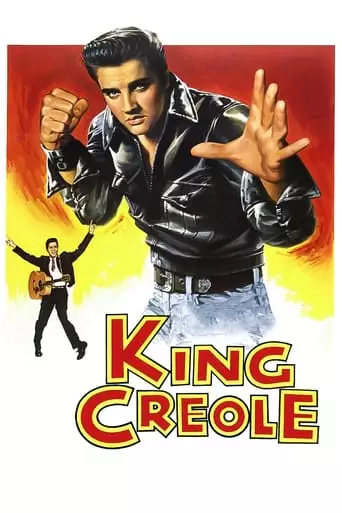
King Creole (1958) Watch Online Free
Danny Fisher, young delinquent, flunks out of high school. He quits his job as a busboy in a nightclub, and one night he gets the chance to perform. Success is imminent and the local crime boss Maxie Fields wants to hire him to perform at his night club The Blue Shade. Danny refuses, but Fields won’t take no for an answer.
King Creole is a 1958 American musical drama directed by Michael Curtiz, featuring Elvis Presley in a role that marked a significant departure from his earlier, more formulaic films. The narrative centers on Danny Fisher (Elvis Presley), a 19-year-old high school student in New Orleans who, after his mother’s death, becomes the primary breadwinner for his father and sister. His father, Mr. Fisher (Dean Jagger), struggles with unemployment and depression, leading the family to the French Quarter. Danny’s life takes a tumultuous turn as he becomes entangled with local gang leader Maxie Fields (Walter Matthau) and his moll, Ronnie (Carolyn Jones). Despite his father’s wishes for him to stay in school, Danny is lured into the nightlife of the French Quarter, performing at the King Creole nightclub. The film explores themes of youthful rebellion, the search for identity, and the allure of the underworld, all set against the vibrant backdrop of New Orleans.
Danny’s journey reflects the universal struggle of adolescence, where the desire for independence clashes with societal expectations. His defiance of authority figures, including his father and school officials, underscores the quest for self-discovery and the challenges of navigating adulthood.
The film delves into the seductive nature of the criminal underworld. Danny’s involvement with Maxie Fields and the associated gang activities highlights the dangers of temptation and the ease with which one can be drawn into a life of crime, especially when seeking belonging or financial stability.
The strained relationship between Danny and his father, Mr. Fisher, is central to the narrative. Mr. Fisher’s disappointment in his son’s choices and his own personal struggles reflect the complexities of parental expectations and the generational divide in understanding and communication.
The film portrays the complexities of romantic relationships, particularly through Danny’s interactions with Ronnie. Her involvement with Maxie and her own moral ambiguities introduce themes of trust, betrayal, and the impact of past choices on present relationships.
Upon its release, King Creole received critical acclaim for its mature themes and Elvis Presley’s compelling performance. Critics praised the film for its realistic portrayal of teenage life and its departure from the typical musical formula. The film’s success demonstrated that Presley could handle more serious roles, paving the way for future projects that showcased his acting abilities. King Creole is often cited as one of Presley’s best films, highlighting his potential as a serious actor beyond his musical career.
Elvis Presley delivers a nuanced and compelling portrayal of Danny Fisher, showcasing his acting range and depth. His performance adds authenticity to the character, making Danny’s internal struggles and growth resonate with the audience.
The film captures the vibrant atmosphere of New Orleans, immersing viewers in its unique culture and setting. The city’s rich musical heritage and lively streets provide a dynamic backdrop that enhances the storytelling.
Unlike many of Presley’s earlier films, King Creole tackles complex themes such as rebellion, identity, and the allure of the criminal underworld. This mature approach offers a more profound cinematic experience.
The film features a talented supporting cast, including Walter Matthau as the menacing Maxie Fields and Carolyn Jones as the enigmatic Ronnie. Their performances add depth and tension to the narrative.
While the film is more dramatic, it still includes memorable musical sequences that highlight Presley’s musical talents. Songs like Trouble and Hard Headed Woman are integrated seamlessly into the storyline.
Directed by Michael Curtiz, known for classics like Casablanca, the film benefits from his expert direction, ensuring a well-paced and engaging narrative. Curtiz’s ability to blend musical elements with drama is evident throughout the film.
King Creole holds a special place in cinematic history as a film that bridged the gap between musical and dramatic genres. It reflects the evolving landscape of 1950s cinema and the changing portrayal of youth culture.
After watching King Creole, you will likely experience a mix of admiration for Elvis Presley’s acting prowess and appreciation for the film’s mature storytelling. The film’s realistic portrayal of teenage rebellion and the complexities of father-son relationships may evoke a sense of empathy and reflection. The atmospheric setting of New Orleans, combined with the film’s dramatic tension, creates an immersive experience that lingers after the credits roll. Overall, King Creole offers a compelling narrative that challenges traditional genre boundaries, leaving you with a sense of having witnessed a significant work in cinematic history.
